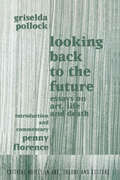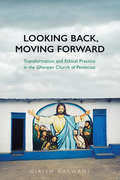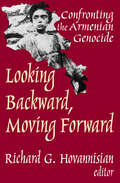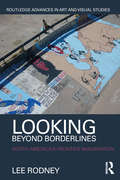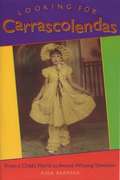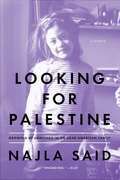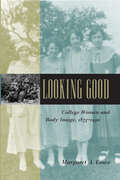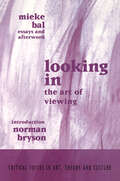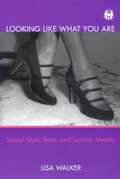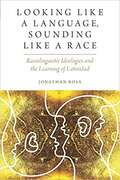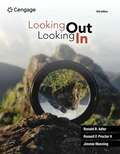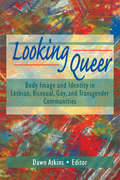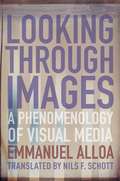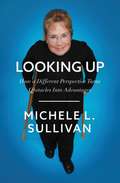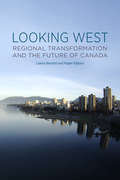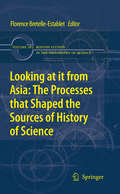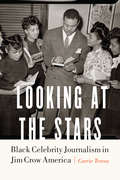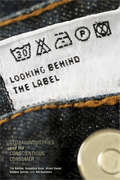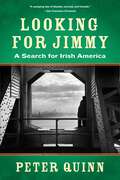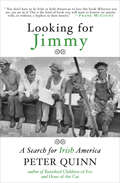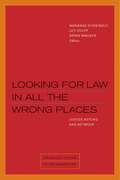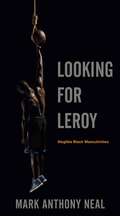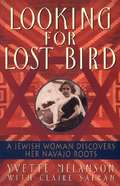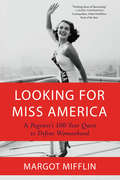- Table View
- List View
Looking Back to the Future: 1990-1970 (Critical Voices in Art, Theory and Culture)
by Griselda PollockFirst Published in 2000. Routledge is an imprint of Taylor & Francis, an informa company.
Looking Back, Moving Forward
by Girish DaswaniHow do Ghanaian Pentecostals resolve the contradictions of their own faith while remaining faithful to their religious identity? Bringing together the anthropology of Christianity and the anthropology of ethics, Girish Daswani's Looking Back, Moving Forward investigates the compromises with the past that members of Ghana's Church of Pentecost make in order to remain committed Christians.Even as church members embrace the break with the past that comes from being "born-again," many are less concerned with the boundaries of Christian practice than with interpersonal questions - the continuity of suffering after conversion, the causes of unhealthy relationships, the changes brought about by migration - and how to deal with them. By paying ethnographic attention to the embodied practices, interpersonal relationships, and moments of self-reflection in the lives of members of the Church of Pentecost in Ghana and amongst the Ghanaian diaspora in London, Looking Back, Moving Forward explores ethical practice as it emerges out of the questions that church members and other Ghanaian Pentecostals ask themselves.
Looking Backward, Moving Forward: Confronting the Armenian Genocide
by Richard G. HovannisianThe decades separating our new century from the Armenian Genocide, the prototype of modern-day nation-killings, have fundamentally changed the political composition of the region. Virtually no Armenians remain on their historic territories in what is today eastern Turkey. The Armenian people have been scattered about the world. And a small independent republic has come to replace the Armenian Soviet Socialist Republic, which was all that was left of the homeland as the result of Turkish invasion and Bolshevik collusion in 1920. One element has remained constant. Notwithstanding the eloquent, compelling evidence housed in the United States National Archives and repositories around the world, successive Turkish governments have denied that the predecessor Young Turk regime committed genocide, and, like the Nazis who followed their example, sought aggressively to deflect blame by accusing the victims themselves.This volume argues that the time has come for Turkey to reassess the propriety of its approach, and to begin the process that will allow it move into a post-genocide era. The work includes "Genocide: An Agenda for Action," Gijs M. de Vries; "Determinants of the Armenian Genocide," Donald Bloxham; "Looking Backward and Forward," Joyce Apsel; "The United States Response to the Armenian Genocide," Simon Payaslian; "The League of Nations and the Reclamation of Armenian Genocide Survivors," Vahram L. Shemmassian; "Raphael Lemkin and the Armenian Genocide," Steven L. Jacobs; "Reconstructing Turkish Historiography of the Armenian Massacres and Deaths of 1915," Fatma Muge Go;cek; "Bitter-Sweet Memories; "The Armenian Genocide and International Law," Joe Verhoeven; "New Directions in Literary Response to the Armenian Genocide," Rubina Peroomian; "Denial and Free Speech," Henry C. Theriault; "Healing and Reconciliation," Ervin Staub; "State and Nation," Raffi K. Hovannisian.
Looking Beyond Borderlines: North America's Frontier Imagination (Routledge Advances in Art and Visual Studies)
by Lee RodneyAmerican territorial borders have undergone significant and unparalleled changes in the last decade. They serve as a powerful and emotionally charged locus for American national identity that correlates with the historical idea of the frontier. But the concept of the frontier, so central to American identity throughout modern history, has all but disappeared in contemporary representation while the border has served to uncomfortably fill the void left in the spatial imagination of American culture. This book focuses on the shifting relationship between borders and frontiers in North America, specifically the ways in which they have been imaged and imagined since their formation in the 19th century and how tropes of visuality are central to their production and meaning. Rodney links ongoing discussions in political geography and visual culture in new ways to demonstrate how contemporary American borders exhibit security as a display strategy that is resisted and undermined through a variety of cultural practices.
Looking For Carrascolendas: From a Child's World to Award-Winning Television
by Aida BarreraIf your childhood friends were Agapito, the bombastic, bilingual lion; Campamocha, the fix-it man; Caracoles, the restaurant owner; Uncle Andy, the shoe seller; Berta and Dyana, the life-size dolls; and Señorita Barrera, then you grew up watching Carrascolendas. This award-winning show, which originally aired on PBS in the 1970s and was subsequently broadcast throughout the country in the 1980s and 1990s, was the first Spanish and English children's educational television program broadcast to national audiences in the United States. In this engagingly written memoir, creator-producer Aida Barrera describes how the mythical world of Carrascolendas grew out of her real-life experiences as a Mexican American child growing up in the Valley of South Texas. She recalls how she drew on those early experiences to create television programming that specifically addressed the needs of Hispanic children, even as it remained accessible and entertaining to children of other cultural backgrounds. In addition to her personal story, Barrera recounts the long-term struggles for network acceptance and funding that made the production of Carrascolendas something of a miracle. This off-camera story adds an important chapter to the history of Anglo-Mexican cultural politics during the 1970s. Given the fact that Latino characters are still under- and stereotypically represented on network television, Carrascolendas remains an important reminder of what is possible and what has been lost in authentically multicultural television programming. An award-winning television producer with extensive experience in broadcasting, public policy, and education, Aida Barrera was the creator, executive producer, and project director of Carrascolendas. She lives in Austin, Texas.
Looking For Palestine: Growing Up Confused In An Arab-American Family
by Najla SaidThe daughter of a prominent Palestinian father and a sophisticated Lebanese mother, Majla Said grew up in New York City, confused and conflicted about her cultural background and identity. But while her father and brother shared a passion for debate about the politics of the Middle East and her mother held on deeply to her Lebanese roots, Said was satisfied to be her father's darling daughter, content with her life on Manhattan's Upper West Side. Her home life was rich and embracing, but outside her apartment she felt entirely unsure about who she was supposed to be, and often in denial of the differences she sensed between her family and those around her. She may have been born a Palestinian Lebanese American, but in her own mind she grew up first as a WASP (baptized Episcopalian in Boston; attending Chapin, the wealthy Upper East Side girls' school), then as a teenage Jew, essentially denying her true roots, even to herself, until well into adulthood. The fact that her father was Edward Said - the famous intellectual, founding father of postcolonial thought, and outspoken advocate for the political and human rights of the Palestinian people - only made things more complicated. Said knew that her parents identified deeply with the countries they had come from, but growing up in a Manhattan world that was defined largely by class and confirmity, where she felt her family was a cultural island all its own, she sought comfort by fitting in with their peers, until, ultimately, the psychological toll of her self-hatred began to threaten her health. As she grew older, and made increased visits to Palestine and Beirut, Said's worldview shifted. The attacks on the World Trade Center, and some of the ways in which Americans responded, finally made it impossible for her to continue to pick and choose her identity, and allowed her to see herself and her passions more clearly. In Looking for Palestine, she shares the journey to this understanding and the experience of growing up in an immigrant family and learning to embrace its cultures. Praise for Looking for Palestine 'Najla Said's Looking for Palestine is a compassionate and candid book on her courageous coming-of-age in contemporary America. Said is a brilliant, talented, and sensitive artist with a larger-than-life, loving father. ' Professor Cornel West' A deeply penetrating, often hilarious, and occasionally devastating account of growing up Arab-American. After finally finding the conviction to be at peace with herself, Najla Said has written more than a memoir. Looking for Palestine is a survivor's guide for all of us who live with that feeling of being out of place wherever we are. ' Moustafa Bayoumi, author of How Does It Feel to Be a Problem? Being Young and Arab in America' thoughtful, searching, and open-eyed, Looking for Palestine takes readers on a journey into an Arab-American girl's search for identity . . . A haunting and singular life story. ' Diana Abu-Jaber, author of Crescent' It can be a difficult story to tell: that of one's discontent in the midst of privilege. And yet with great skill, humor, and poignancy, Said accomplishes just that. In the end, she is her late father's great inheritor, ever journeying toward that elusive home.
Looking Good: College Women and Body Image, 1875-1930 (Gender Relations in the American Experience)
by Margaret A. LoweWinner of the Bridgewater State College Class of 1950 Distinguished Faculty Research Award Toward the end of the nineteenth century, as young women began entering college in greater numbers than ever before, physicians and social critics charged that campus life posed grave hazards to the female constitution and women's reproductive health. "A girl could study and learn," Dr. Edward Clarke warned in his widely read 1873 book Sex in Education, "but she could not do all this and retain uninjured health, and a future secure from neuralgia, uterine disease, hysteria, and other derangements of the nervous system." For half a century, ideas such as Dr. Clarke's framed the debate over a woman's place in higher education almost exclusively in terms of her body and her health.For historian Margaret A. Lowe, this obsession offers one of the clearest expressions of the social and cultural meanings given to the female body between 1875 and 1930. At the same time, the "college girl" was a novelty that tested new ideas about feminine beauty, sexuality, and athleticism. In Looking Good, Lowe examines the ways in which college women at three quite different institutions—Cornell University, Smith College, and Spelman College—regarded their own bodies in this period. Contrasting white and black students, single-sex and coeducational schools, secular and religious environments, and Northern and Southern attitudes, Lowe draws on student diaries, letters, and publications; institutional records; and accounts in the popular press to examine the process by which new, twentieth-century ideals of the female body took hold in America.
Looking In: The Art of Viewing (Critical Voices in Art, Theory and Culture)
by Norman Bryson Mieke BalFirst published in 2001. Routledge is an imprint of Taylor & Francis, an informa company.
Looking Like What You Are: Sexual Style, Race, and Lesbian Identity
by Lisa WalkerLooks can be deceiving, and in a society where one's status and access to opportunity are largely attendant on physical appearance, the issue of how difference is constructed and interpreted, embraced or effaced, is of tremendous import. Lisa Walker examines this issue with a focus on the questions of what it means to look like a lesbian, and what it means to be a lesbian but not to look like one. She analyzes the historical production of the lesbian body as marked, and studies how lesbians have used the frequent analogy between racial difference and sexual orientation to craft, emphasize, or deny physical difference. In particular, she explores the implications of a predominantly visible model of sexual identity for the feminine lesbian, who is both marked and unmarked, desired and disavowed. Walker's textual analysis cuts across a variety of genres, including modernist fiction such as The Well of Loneliness and Wide Sargasso Sea, pulp fiction of the Harlem Renaissance, the 1950s and the 1960s, post-modern literature as Michelle Cliff's Abeng, and queer theory. In the book's final chapter, "How to Recognize a Lesbian," Walker argues that strategies of visibility are at times deconstructed, at times reinscribed within contemporary lesbian-feminist theory.
Looking Like a Language, Sounding Like a Race: Raciolinguistic Ideologies and the Learning of Latinidad (Oxford Studies in Anthropology of Language Series)
by Jonathan RosaLooking like a Language, Sounding like a Race examines the emergence of linguistic and ethnoracial categories in the context of Latinidad. <p><p>The book draws from more than twenty-four months of ethnographic and sociolinguistic fieldwork in a Chicago public school, whose student body is more than 90% Mexican and Puerto Rican, to analyze the racialization of language and its relationship to issues of power and national identity. It focuses specifically on youth socialization to U.S. Latinidad as a contemporary site of political anxiety, raciolinguistic transformation, and urban inequity. <p><p> Jonathan Rosa's account studies the fashioning of Latinidad in Chicago's highly segregated Near Northwest Side; he links public discourse concerning the rising prominence of U.S. Latinidad to the institutional management and experience of raciolinguistic identities there. <p><p>Anxieties surrounding Latinx identities push administrators to transform "at risk" Mexican and Puerto Rican students into "young Latino professionals." This institutional effort, which requires students to learn to be and, importantly, sound like themselves in highly studied ways, reveals administrators' attempts to navigate a precarious urban terrain in a city grappling with some of the nation's highest youth homicide, dropout, and teen pregnancy rates. Rosa explores the ingenuity of his research participants' responses to these forms of marginalization through the contestation of political, ethnoracial, and linguistic borders.
Looking Out, Looking In: Activities Manual and Study Guide (MindTap Course List)
by Ronald B. Adler Russell F. Proctor Jimmie ManningLearn how to master and apply strong communication principles in both your personal relationships and on the job with Adler/Proctor/Manning's popular LOOKING OUT, LOOKING IN, 16E. Written with you in mind, this market-leading book connects today's latest research and theories to your everyday life. This is a textbook you'll actually enjoy reading with current, captivating magazine-style readings and the latest pop culture references -- from recent Marvel movies to viral stars rising through TikTok. This edition continues to focus on the impact of social media and technology on relationships, whether it's "Netflix and chill" or families tethered to cell phones during dinner. You explore the lives of diverse people as you gain a wide sense of understanding about relationships. Compelling photos and cartoons, thought-provoking prompts and hands-on activities bring principles to life. MindTap digital resources are also available to reinforce learning.
Looking Queer: Body Image and Identity in Lesbian, Bisexual, Gay, and Transgender Communities
by Dawn AtkinsLooking Queer: Body Image in Lesbian, Bisexual, Gay, and Transgender Communities contains research, firsthand accounts, poetry, theory, and journalistic essays that address and outline the special needs of sexual minorities when dealing with eating disorders and appearance obsession. Looking Queer will give members of these communities hope, insight, and information into body image issues, helping you to accept and to love your body. In addition, scholars, health care professionals, and body image activists will not only learn about queer experiences and identity and how they affect individuals, but will also understand how some of the issues involved affect society as a whole. Dismantling the myth that body image issues affect only heterosexual women, Looking Queer explores body issues based on gender, race, class, age, and disability. Furthermore, this groundbreaking book attests to the struggles, pain, and triumph of queer people in an open and comprehensive manner. More than 60 contributors provide their knowledge and personal experiences in dealing with body image issues exclusive to the gay and transgender communities, including: exploring and breaking down the categories of gender and sexuality that are found in many body image issues finding ways to heal yourself and your community discovering what it means to “look like a dyke” or to “look gay” fearing fat as a sign of femininity determining what race has to do with the gay ideal discussing the stereotyped ”double negative”--being a fat lesbian learning strategies of resistance to societal ideals critiquing ”the culture of desire” within gay men’s communities that emphasizes looks above everything elseRevealing new and complex dimensions to body image issues, Looking Queer not only discusses the struggles and hardships of gay, lesbian, bisexual, and transgendered persons, but looks at the processes that can lead to acceptance of oneself. Written by both men and women, the topics and research in Looking Queer offer insight into the lives of people you can relate to, enabling you to learn from their experiences so you, too, can find joy and happiness in accepting your body.Visit Dawn Atkin’s website at: http://home.earthlink.net/~dawn_atkins/
Looking Through Images: A Phenomenology of Visual Media (Columbia Themes in Philosophy, Social Criticism, and the Arts)
by Emmanuel AlloaImages have always stirred ambivalent reactions. Yet whether eliciting fascinated gazes or iconoclastic repulsion from their beholders, they have hardly ever been seen as true sources of knowledge. They were long viewed as mere appearances, placeholders for the things themselves or deceptive illusions. Today, the traditional critique of the spectacle has given way to an unconditional embrace of the visual. However, we still lack a persuasive theoretical account of how images work.Emmanuel Alloa retraces the history of Western attitudes toward the visual to propose a major rethinking of images as irreplaceable agents of our everyday engagement with the world. He examines how ideas of images and their powers have been constructed in Western humanities, art theory, and philosophy, developing a novel genealogy of both visual studies and the concept of the medium. Alloa reconstructs the earliest Western media theory—Aristotle’s concept of the diaphanous milieu of vision—and the significance of its subsequent erasure in the history of science. Ultimately, he argues for a historically informed phenomenology of images and visual media that explains why images are not simply referential depictions, windows onto the world. Instead, images constantly reactivate the power of appearing. As media of visualization, they allow things to appear that could not be visible except in and through these very material devices.
Looking Up: How a Different Perspective Turns Obstacles into Advantages
by Michele SullivanWe&’ve all had moments of feeling like we didn&’t belong, but imagine being born into a world where fitting in was never an option. Michele Sullivan, who has a rare form of dwarfism, shares how her physical posture taught her the most effective relational posture with others, which helped her become one of the most powerful women in philanthropy.Born with a rare form of dwarfism, Michele has spent her life looking up. As the first female president of the Caterpillar Foundation, she has used her unique point of view to impact countless lives around the world.As a child, Michele realized she had a choice to make. A life-changing choice.She could tailor her differences into something more suitable for the world.She could hide from the world and live on the fringe.Or, she could embrace her differences, turn them into assets, and come to recognize that there was a strength within them that could help others.She chose the third option.Looking Up is the story of how Michele became the smallest woman at the largest earth-moving manufacturer in the world. Her story begins with her passage from a young person who, in spite of being looked down upon by others, learned to look up: to find an elevated view of others that would change the course of millions of lives.While her height has presented challenges that are different from those most have experienced (containing some uniquely humorous moments as well), it has allowed her to see things, literally and figuratively, that others do not. Embedded in this narrative are unique takeaways for individuals about the importance of making the first move, being wrong at first, choosing intimacy over influence, and learning that asking for help is a strength, not a weakness. Looking Up is poised to be an inspiring nonfiction work full of heartfelt lessons that will resonate with individuals in their lives and at work.
Looking West: Regional Transformation And The Future Of Canada
by Loleen Berdahl Roger GibbinsAlthough a history of protest politics has done so much to define western Canada and to place it outside the Canadian mainstream, the aspirations and frustrations that animated western discontent over the years have been replaced by a new reality: the West is in, and many of the levers of national economic and political power rest in western Canadian hands. The protest tradition has yielded a dynamic region that leads rather than reacts to national economic, social, and political change. The westward shift of the Canadian economy and demography is likely to be an enduring structural change that reflects and is reinforced by the transformation of the continental and global economies. At the same time, western Canada faces major challenges, including finding a place for a sustainable resource economy in a rapidly changing global environment, establishing a full and modern partnership with Aboriginal peoples, and creating urban environments that will attract and retain human capital. None of these challenges are unique to the West but they all play out with great force, and great immediacy, in western Canada.
Looking at it from Asia: the Processes that Shaped the Sources of History of Science
by Karine Chemla Agathe Keller Christine Proust Catherine Jami Florence Bretelle-EstabletThe idea of this volume took shape within a group of scholars working on the history of science in Asia. Despite the great differences in time, locations and disciplines between our respective fields of research, we all faced similar situations: among the huge mass of written documents available to historians and that were eventually taken as sources in the historiography of science, some had been well studied while others had been dismissed or ignored. This observation will seem obvious to historians, whose daily work consists in shaping corpuses to raise new questions. The diagnosis has long been established that such selections related to the historians' agenda and thereby reflected the ways in which historiography somehow belonged to its time. Yet, it appeared to us that this diagnosis was insufficient and that the selective consideration of source material was also at least partly related to mechanisms of selection that occurred upstream from the historian's classical work of shaping a corpus. Therefore, we came to the idea that, in order to write, or to rewrite, chapters in the history of science, historians may benefit from relying on a critical analysis of the factors that, along history, shaped the documents that have become their sources or the collections from which they constitute their corpuses. It is to the development of such a branch of critical analysis in the history of science, to its methods and to its benefits --to be illustrated in carefully chosen case studies--, that we suggest to devote a collective research and a book. We want to inquire into how the corpuses we form incorporate long sequences of selections and reorganizations that took place in history and that must be brought to light if we do not want various types of actors of the past to carve their choices and conceptions into our questions and conclusions.
Looking at the Stars: Black Celebrity Journalism in Jim Crow America
by Carrie TeresaAs early as 1900, when moving-picture and recording technologies began to bolster entertainment-based leisure markets, journalists catapulted entertainers to godlike status, heralding their achievements as paragons of American self-determination. Not surprisingly, mainstream newspapers failed to cover black entertainers, whose “inherent inferiority” precluded them from achieving such high cultural status. Yet those same celebrities came alive in the pages of black press publications written by and for members of urban black communities. In Looking at the Stars Carrie Teresa explores the meaning of celebrity as expressed by black journalists writing against the backdrop of Jim Crow–era segregation. Teresa argues that journalists and editors working for these black-centered publications, rather than simply mimicking the reporting conventions of mainstream journalism, instead framed celebrities as collective representations of the race who were then used to symbolize the cultural value of artistic expression influenced by the black diaspora and to promote political activism through entertainment. The social conscience that many contemporary entertainers of color exhibit today arguably derives from the way black press journalists once conceptualized the symbolic role of “celebrity” as a tool in the fight against segregation. Based on a discourse analysis of the entertainment content of the period’s most widely read black press newspapers, Looking at the Stars takes into account both the institutional perspectives and the discursive strategies used in the selection and framing of black celebrities in the context of Jim Crowism.
Looking behind the Label
by Nik Summers Hiram Samel Sebastian Koos Tim Bartley Gustavo SetriniWhat does it mean when consumers "shop with a conscience" and choose products labeled as fair or sustainable? Does this translate into meaningful changes in global production processes? To what extent are voluntary standards implemented and enforced, and can they really govern global industries? Looking behind the Label presents an informative introduction to global production and ethical consumption, tracing the links between consumers' choices and the practices of multinational producers and retailers. Case studies of several types of products--wood and paper, food, apparel and footwear, and electronics--are used to reveal what lies behind voluntary rules and to critique predominant assumptions about ethical consumption as a form of political expression.
Looking for Jimmy: A Search For Irish America
by Peter QuinnIn this stunning work chronicling the author’s exploration of his own past—and the lives of many hundreds of thousands of nameless immigrants who struggled alongside his own ancestors—Peter Quinn paints a brilliant new portrait of the Irish-American men and women whose evolving culture and values continue to play such a central role in all of our identities as Americans. In Quinn’s hands, the Irish stereotype of “Paddy” gives way to an image of “Jimmy”—an archetypal Irish-American. From Irish immigration to modern politics, Quinn vibrantly weaves together the story of a remarkable people and their immeasurable contribution to American history and culture.
Looking for Jimmy: A Search for Irish America
by Peter Quinn“[An] exceptionally thoughtful and interesting inquiry into Irish America . . . More a meditation than a history” from the acclaimed author of Dry Bones (The Washington Post). In the hands of historical novelist and speechwriter Peter Quinn, the Irish stereotype of “Paddy” gives way to an image of “Jimmy”—an archetypal Irish American (a composite of Jimmy Cagney and Jimmy Walker) who comes to life as a fast-talking, tough-yet-refined urban American redefining US politics, street culture, religion, and imagination. From immigrating to the United States to modern day politics, Quinn’s vibrant prose weaves together the story of a people that has made an immeasurable contribution to American history and culture. “Entertaining and informative . . . There are portraits of the Irish as politician, cop, priest, teacher, writer. In this deft examination of America’s Irish, Quinn adds color and nostalgia with his tales of growing up and working in the Bronx of another time.” —Publishers Weekly “You don’t have to be Irish or Irish-American to love this book. Whoever you are, you are in it. This is the kind of book you will want to bestow on anyone with, or without, a hyphen in their history.” —Frank McCourt, Pulitzer Prize–winning author of Angela’s Ashes “Well written and researched, showcasing the author’s pride in his Irish Catholic heritage.” —Kirkus Reviews
Looking for Law in All the Wrong Places: Justice Beyond and Between (Berkeley Forum in the Humanities)
by Wendy Brown Saba Mahmood Daniel Boyarin Christopher Tomlins Samera Esmeir Ramona Naddaff Kathryn Abrams Sara Ludin Sarah Song Rebecca M. McLennan Bath H. Piatote Daniel FisherFor many inside and outside the legal academy, the right place to look for law is in constitutions, statutes, and judicial opinions. This book looks for law in the “wrong places”—sites and spaces in which no formal law appears. These may be geographic regions beyond the reach of law, everyday practices ungoverned or ungovernable by law, or works of art that have escaped law’s constraints.Looking for Law in All the Wrong Places brings together essays by leading scholars of anthropology, cultural studies, history, law, literature, political science, race and ethnic studies, religion, and rhetoric, to look at law from the standpoint of the humanities. Beyond showing law to be determined by or determinative of distinct cultural phenomena, the contributors show how law is itself interwoven with language, text, image, and culture.Many essays in this volume look for law precisely in the kinds of “wrong places” where there appears to be no law. They find in these places not only reflections and remains of law, but also rules and practices that seem indistinguishable from law and raise challenging questions about the locations of law and about law’s meaning and function. Other essays do the opposite: rather than looking for law in places where law does not obviously appear, they look in statute books and courtrooms from perspectives that are usually presumed to have nothing to say about law.Looking at law sideways, or upside down, or inside out defamiliarizes law. These essays show what legal understanding can gain when law is denied its ostensibly proper domain.Contributors: Kathryn Abrams, Daniel Boyarin, Wendy Brown, Marianne Constable, Samera Esmeir, Daniel Fisher, Sara Ludin, Saba Mahmood, Rebecca McLennan, Ramona Naddaff, Beth Piatote, Sarah Song, Christopher Tomlins, Leti Volpp, Bryan Wagner
Looking for Leroy: Illegible Black Masculinities (Postmillennial Pop #4)
by Mark Anthony NealMark Anthony Neal’s Looking for Leroy is an engaging and provocative analysis of the complex ways in which black masculinity has been read and misread through contemporary American popular culture. Neal argues that black men and boys are bound, in profound ways, to and by their legibility. The most “legible” black male bodies are often rendered as criminal, bodies in need of policing and containment. Ironically, Neal argues, this sort of legibility brings welcome relief to white America, providing easily identifiable images of black men in an era defined by shifts in racial, sexual, and gendered identities. Neal highlights the radical potential of rendering legible black male bodies—those bodies that are all too real for us—as illegible, while simultaneously rendering illegible black male bodies—those versions of black masculinity that we can’t believe are real—as legible. In examining figures such as hip-hop entrepreneur and artist Jay-Z, R&B Svengali R. Kelly, the late vocalist Luther Vandross, and characters from the hit HBO series The Wire, among others, Neal demonstrates how distinct representations of black masculinity can break the links in the public imagination that create antagonism toward black men. Looking for Leroy features close readings of contemporary black masculinity and popular culture, highlighting both the complexity and accessibility of black men and boys through visual and sonic cues within American culture, media, and public policy. By rendering legible the illegible, Neal maps the range of identifications and anxieties that have marked the performance and reception of post-Civil Rights era African American masculinity.
Looking for Lost Bird: A Jewish Woman Discovers Her Navajo Roots
by Yvette D. Melanson Claire SafranIn this haunting memoir, Yvette Melanson tells of being raised to believe that she was white and Jewish. At age forty-three, she learned that she was a "Lost Bird," a Navajo child taken against her family's wishes, and that her grieving birth mother had never stopped looking for her until the day she died... This is the story of her learning who she is.
Looking for Miss America: A Pageant's 100-Year Quest to Define Womanhood
by Margot MifflinFrom an author praised for writing “delicious social history” (Dwight Garner, The New York Times) comes a lively account of memorable Miss America contestants, protests, and scandals—and how the pageant, nearing its one hundredth anniversary, serves as an unintended indicator of feminist progressLooking for Miss America is a fast–paced narrative history of a curious and contradictory institution. From its start in 1921 as an Atlantic City tourist draw to its current incarnation as a scholarship competition, the pageant has indexed women’s status during periods of social change—the post–suffrage 1920s, the Eisenhower 1950s, the #MeToo era. This ever–changing institution has been shaped by war, evangelism, the rise of television and reality TV, and, significantly, by contestants who confounded expectations.Spotlighting individuals, from Yolande Betbeze, whose refusal to pose in swimsuits led an angry sponsor to launch the rival Miss USA contest, to the first black winner, Vanessa Williams, who received death threats and was protected by sharpshooters in her hometown parade, Margot Mifflin shows how women made hard bargains even as they used the pageant for economic advancement. The pageant’s history includes, crucially, those it excluded; the notorious Rule Seven, which required contestants to be “of the white race,” was retired in the 1950s, but no women of color were crowned until the 1980s.In rigorously researched, vibrant chapters that unpack each decade of the pageant, Looking for Miss America examines the heady blend of capitalism, patriotism, class anxiety, and cultural mythology that has fueled this American ritual.
